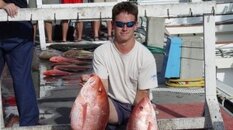Jaws’ in Australia: frantic hunt is on for great white shark that killed Houston man

Wainwright after a deep sea fishing expedition.
Posted: Sunday, October 23, 2011 10:29 am | Updated: 12:16 pm, Sun Oct 23, 2011.
Officials along a popular stretch of beach near Perth, Australia are hunting a 10-foot great white shark which killed a Houston man Saturday as he was scuba diving with friends.
George Thomas Wainwright, 32, lived in the Town & Country/Memorial area and had been in Perth for about six months on a work visa. Sources said he was employed by a marine transport company serving the offshore oil industry.
Wainwright is the third person killed by a great white in two months, and there’s controversy over whether this is a “Jaws”-type series of attacks by a single, rogue shark or attacks by different sharks. Because of the similarities to the book and movie “Jaws” — deadly attacks along a beach frequented by tourists and the growing cry to hunt the shark or sharks, Wainwright’s death and the ensuing hunt has rapidly gained worldwide attention.
Friends remained in the boat while he was diving solo, they told authorities. They saw a flurry of bubbles, they said, and his body rose to the surface with what one investigator described as “horrific” injuries. That investigator said he was likely already dead when his friends pulled him into the boat.
His companions related a terrifying story of the shark aggressively bumping their small boat as they attempted to save Wainwright and flee.
For the first time, Australian officials have used an emergency measure to suspend protection of great whites as an endangered species in order to protect the public. They have set hooks baited with tuna around the area of the attacks — Rottnest Island, a popular tourist resort known for its white, sandy beaches, international-caliber surfing, cruises to spot whales and dolphins, and vineyards and wineries that produce shiraz wine.
“This is a unique set of circumstances, and I’m desperately ... praying this is not the beginning of a new trend ... and we’re going to have these on a regular basis,” Western Australia state Fisheries Minister Norman Moore said on Sunday, according to the Daily Mail.
Scientists are reportedly disputing the single-shark theory.
“What we’ve seen tragically is three cases of people by sheer bad luck being in the wrong place at the wrong time,” federal government marine biologist Barry Bruce, an expert in great white sharks and their movements, was quoted as saying.
An online poll and survey by the news organization PerthNow indicated a majority of respondents do not believe the shark should be killed.







